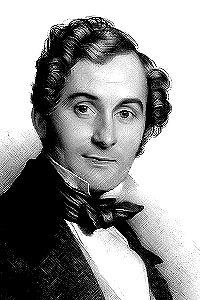Introduction

Born: October 23, 1801, Berlin, Germany.
Died: January 21, 1851, Berlin, Germany.
Buried: Berlin, Germany.

Born: October 23, 1801, Berlin, Germany.
Died: January 21, 1851, Berlin, Germany.
Buried: Berlin, Germany.
Albert was the son of Johann Gottlieb and Charlotte Sophie Lortzing, who had abandoned their leather shop and traveled through Germany as itinerant actors, founding the Berlin theater company Urania, and turning their amateur passion into a profession.
Albert’s first stage appearance was at age 12, entertaining the audience with comic poems during intermission in the Kornhaus at the Freiburg Münster.
From 1817, the Lortzings were part of the Josef Derosi ensemble in the Rhineland, treading the boards in Bonn, Düsseldorf, Barmen and Aachen. Albert became an audience favorite, playing the roles of a youthful lover, a country boy and bon vivant, sometimes also singing small tenor or baritone parts.
Albert married actress Rosina Regine Ahles in 1824, and had 11 children with her. The couple belonged to the Hoftheater in Detmold from late 1826, which toured to Münster and Osnabrück. Lortzing joined the Freemasons, a popular refuge for artists in Metternich’s police state.
He composed an oratorio in Detmold, Die Himmelfahrt Christi, which premiered in Münster, and predictably earned a rebuke for the young composer from the Münster regional governor, who claimed Lortzing would never become famous as a composer.
Lortzing composed the music for Christian Dietrich Grabbe’s Don Juan und Faust, playing the role of Don Juan himself, with his wife as Donna Anna. Lortzing received a glowing report from an anonymous reviewer in a Frankfurt paper, who also mistakenly praised Lortzing for the text by this brilliant poet.
Grabbe, the real poet, was outraged, though the review did bring good publicity for the piece.
On November 3, 1833, the Lortzings gave their debut at the Leipzig Stadttheater. Lortzing’s parents had been members of this ensemble since 1832, under Friedrich Sebald Ringelhardt. Here, Lortzing became a member of the artists’ club Tunnel unter der Pleiße, and in 1834 joined the Leipzig Freemasons lodge Balduin zur Linde. Lortzing was much loved in the Leipzig ensemble, particularly when acting in Johann Nestroy’s comedies. However, his tendency to improvise and deviate from the script attracted the attention of the theatrical police.
His first comic opera, Zar und Zimmermann, had a tough time with the Leipzig censors. It premiered in Leipzig on December 22, 1837. Lortzing himself sang the role of Peter Iwanow, but it did not make a major breakthrough until its Berlin performances in 1839, where it was much praised.
In 1844, Lortzing became Kapellmeister of the Leipzig Stadttheater. After a quarrel with management, he was dismissed in April 1845 due to his rheumatic troubles.
The repeated protests of the public got him reinstated, but he was soon dismissed again after another argument. In an open letter, signed by almost everyone in the ensemble, he made a plea against the measures taken by the city government.
Between 1846 and 1848, Lortzing worked as Kapellmeister at the Theater an der Wien in Vienna. At the behest of the Freedom Movement, he wrote text and music in 1848 for his political opera Regina, named after his wife. This work concerned both labor struggles and fear of suicide.
His last full-length opera was an 1849 fairy tale satire of the Prussian military state called Rolands Knappen, featuring the repeated line Und das soll eine Weltordnung sein?
(And this is supposed to be a world order?).
In 1848, he lost his appointment and had to return to work as a touring actor to support his large family. He worked at Gera and Lüneburg, among other cities. Finally, in 1850, he became the Kapellmeister in Berlin at the newly opened Friedrich-Wilhelmstädtisches Theater.
On January 20, 1851, under huge stress and deeply in debt, he had a stroke the night he was to have attended the premiere of his musical comedy Die Opernprobe. He died the next morning without medical treatment. A number of musical luminaries attended his funeral, including Giacomo Meyerbeer, Heinrich Dorn, Wilhelm Taubert and Carl Friedrich Rungenhagen. Lortzing’s theatrical colleagues decorated his coffin with black, red and gold, a combination forbidden after 1848. A public benefit was later held for his impoverished family.